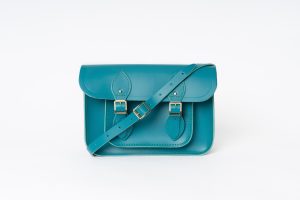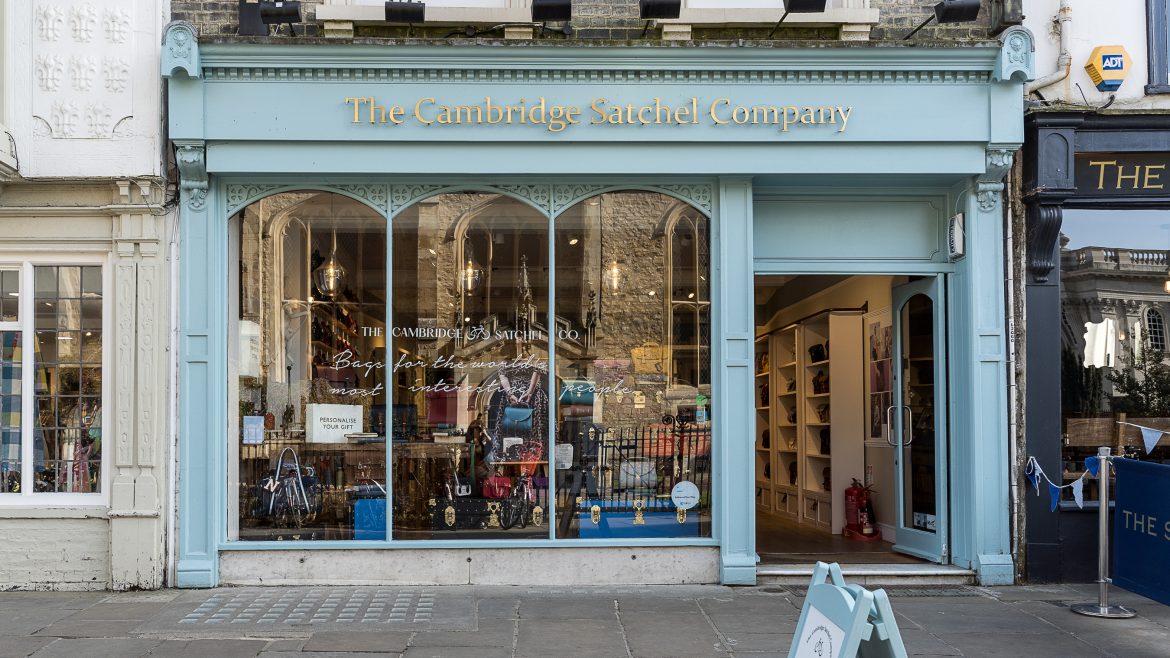Julie Deane looks back on the Cambridge Satchel Company’s successful journey, from her kitchen table to the runway
Words by Nicola Foley
The story of Cambridge Satchel Company is the stuff of Hollywood film plots. Beginning with a worried mum needing to raise some extra cash, and ending with a multimillion-pound, world-famous fashion brand, it’s a bootstrapping story of grit, good fortune – and a really great product. For small businesses, it’s an inspiring example of how right things can go with hard work and fair winds, but it’s even impressed the world’s biggest and most successful companies. Just ask Google, which retold Cambridge Satchel’s origin story in a 2012 advertising campaign for the Chrome browser.
It all started in 2008 at a kitchen table in Cambridge. Julie Deane needed to make money to move her daughter out of her current school, where she was being bullied, into a fee-paying school nearby. Armed with £600 and a list of business ideas, she pondered her options, eventually deciding to take a chance on traditional leather satchels – the kind she remembered fondly from her schooldays.
She found a leather supplier, coded a basic web shop and sales started trickling through. The business looked promising enough. Then, two things happened that dramatically changed the company’s trajectory. First, the bags started getting picked up by celebrities and the fashion blogging elite – giving them cult status in the blink of an eye – and second, they were featured in The Guardian’s Christmas gift guide. Julie remembers this as the real ‘pinch me’ moment.
 “The bag had gone in to be photographed way in advance, and we’d sort of forgotten about it. We were just plodding on and trying to figure out how we could cut and paste a Christmas tree picture on to our website’s homepage,” she laughs. “At the time, my phone would get an alert letting me know there’d been a purchase on the website – and it was just going mad: ping, ping, ping!”
“The bag had gone in to be photographed way in advance, and we’d sort of forgotten about it. We were just plodding on and trying to figure out how we could cut and paste a Christmas tree picture on to our website’s homepage,” she laughs. “At the time, my phone would get an alert letting me know there’d been a purchase on the website – and it was just going mad: ping, ping, ping!”
At first, Julie assumed there was a technical glitch causing a single order to churn around, but when she checked the back end of the website, she was stunned at what she saw: reams and reams of fresh orders as far as the eye could see. It was, she says, “just beyond exciting”.
From there, it wasn’t long before Cambridge Satchels were being heralded as the “British ‘It’ bag” by The New York Times, Urban Outfitters and other high-street shops were added to the list of stockists, and fashion houses – including Erdem, Vivienne Westwood and Comme des Garçons – were knocking on Julie’s door, pleading to work with her.
The whole thing played out like a marketing dream. Julie harnessed the power of influencers (way before it was the norm), and managed to become the toast of the fashion world within a few short months – all on a shoestring budget. And yet, she insists that suggesting she had any kind of clever strategy would be generous.
“More than generous, in fact. I literally learnt everything from googling stuff!” she exclaims. “Really early on, I googled ‘how do you write a press release?’ and followed the guide I found to the letter. But unfortunately, I hadn’t looked at when
it was written. It turned out to be from some historical journal or something. It said ‘you must have three hashtags to signify the end of the press release’, and I thought, ‘OK, I’ll do that’, and sent it off. Somebody got back to me and they were actually laughing! They said it really stood out, because, you know, it had been a good 20 years since they’d seen a press release ending with three hashtags…”
While modern marketing tactics weren’t her forte, one thing Julie did have, in spades, was passion for her product – something she firmly believes has underpinned all of her success. “I honestly believe that the satchel is the best work bag on the planet,” she says simply. “It’s dependable, it’s not fussy – it just lasts, and it does the job. It’s brilliant. When you have total faith in the thing you’re doing, it’s a lot easier – because it’s genuine. I couldn’t have the same enthusiasm for many other things I can think of – maybe with the exception of dogs!”
I do honestly believe that the satchel is the best work bag on the planet. It’s dependable
She also had a willingness to roll up her sleeves and get stuck into whatever job was required, be it coding the first website or teaching herself to emboss the bags. “When you start a business with £600, you have to learn to do an awful lot of things yourself. But, the good thing when you have that many constraints is, you learn your business inside out,” she reflects. “Now, I’m completely aware of all these different parts of the business and how they all work. I’m really interested in all of those aspects. I think that’s been an incredible help through the whole journey.”
Of course, it wouldn’t be a proper Hollywood plot without a baddie. For Julie and her business, this came in the shape of an underhanded manufacturer and rival satchel company that, together, were copying her designs and unlawfully using her leather. She eventually won an out-of-court settlement, resulting in the rival company paying an undisclosed sum to Cambridge Satchel Company, and on the subject now, she’s philosophical.
 “Of course I wish I’d known what a manufacturing agreement was, so I wouldn’t have been ripped off by my manufacturer,” she sighs. “But if I hadn’t gone through that incredibly stressful time, I never would have started my own factory. It was never my intention, but now it’s one of the parts of the business I am most proud of.”
“Of course I wish I’d known what a manufacturing agreement was, so I wouldn’t have been ripped off by my manufacturer,” she sighs. “But if I hadn’t gone through that incredibly stressful time, I never would have started my own factory. It was never my intention, but now it’s one of the parts of the business I am most proud of.”
She adds: “It means we have complete control of our products and our quality, and we are never going to be pushed because someone bigger or better comes along and we’re no longer a priority. These incredibly difficult times do come along, but it is so true when people say that you learn more from a challenge than when something goes brilliantly and you just sail through.”
With bricks-and-mortar shops in Cambridge, Oxford, London and Edinburgh, an OBE, and even a Guinness World Record – alongside Virgin Media Business for watching 160 business pitches for 29 hours – it might seem like Julie’s reached the pinnacle of success, but there’s plenty more she hopes to achieve. She’s especially passionate about helping other business owners, through advising on trade committees and acting as Entrepreneur in Residence at the British Library, where she’s been helping develop business and IP centres to make libraries as useful and relevant as possible.
“We’re taking all the things we’ve learnt and feeding those forward, so other people will benefit,” she explains. “That’s an incredible thing – making a difference. After 12 years of learning so much, to pay that back and do something positive – that’s the thing I’m most proud of.”

